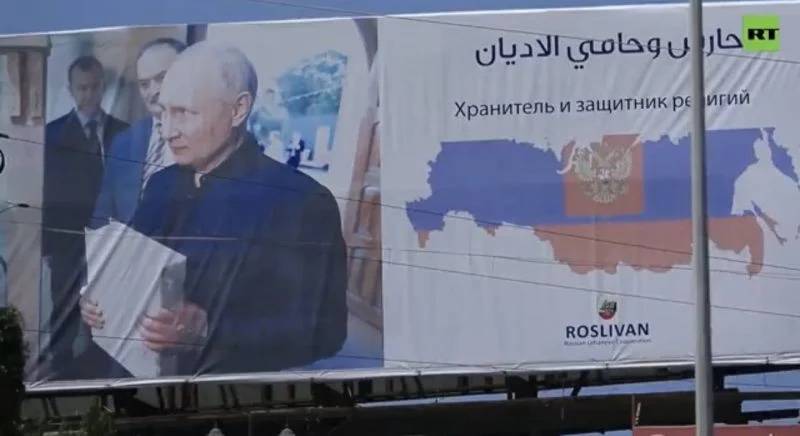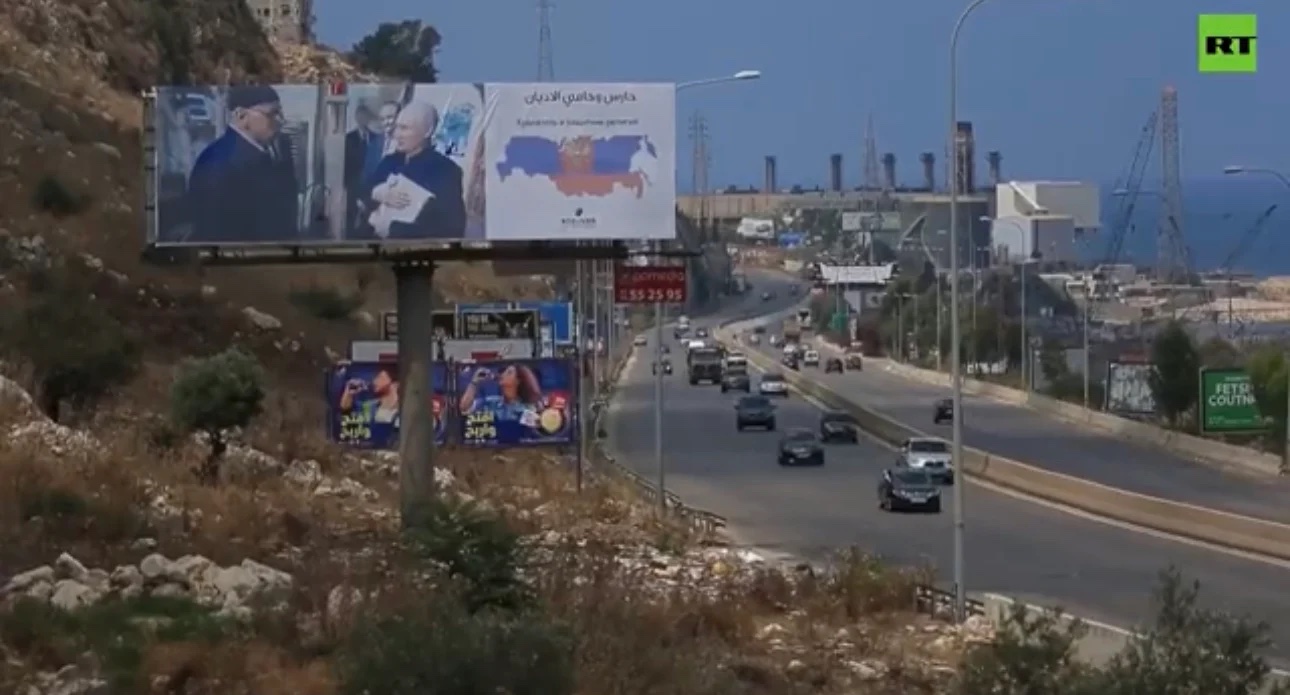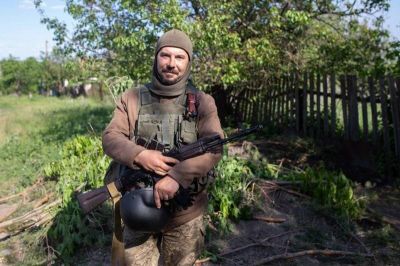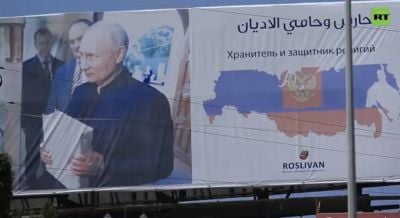
A billboard along a road in Lebanon shows the Russian president holding a copy of the Qoran with the inscription "protector of religions." (Screengrab from a video posted by Russia Today on Twitter)
Billboards have recently emerged along various roads in Lebanon, featuring Russian President Vladimir Putin portrayed as a “protector and defender of religions.” These eye-catching signs depict him holding either a Quran or a Bible. The billboards have been spotted in different locations such as the southern suburbs of Beirut, the Karantina area in northern Beirut, Baalbeck, and along the motorway connecting Tripoli and Balamand in northern Lebanon.
According to reports from the Russian news agency Ria Novosti, the image of the Kremlin leader holding a Quran originated from his visit to a mosque in Dagestan.
The billboards bear the logo and name of an organization called “Roslivan,” which identifies itself as the “Russian-Lebanese Coordination Bureau.” However, there is limited information available about this entity, especially regarding its relationship with the Russian state. Our archives indicate that Roslivan was involved in the distribution of the Sputnik COVID-19 vaccine in Lebanon.
Heading the organization is Mohammad Nasreddine, who discussed the campaign with the Ria Novosti agency. His comments received widespread coverage in the Russian media.
 A billboard along a road in Lebanon shows the Russian president holding a copy of the Koran with the inscription "protector of religions." (Screengrab from a video posted by Russia Today on Twitter)
A billboard along a road in Lebanon shows the Russian president holding a copy of the Koran with the inscription "protector of religions." (Screengrab from a video posted by Russia Today on Twitter)
Putin, ‘protector of morals’
According to Nasreddine, the purpose of the campaign is to counter Western dominance, which he believes is actively undermining religious and moral values. He argues that the United States, Great Britain and certain European nations are pushing for a world filled with racism, religious discrimination and social decay through the imposition and enforcement of their own methods, ideas and behavior.
In contrast, Nasreddine claims that Putin aims to demonstrate his respect for individuality and the religious sentiments of every person. He specifically highlighted that the campaign seeks to denounce the recent incident of a Quran being burned in Sweden.
On June 28, Salwan Momika, an Iraqi refugee residing in Sweden, set fire to pages of the Quran outside Stockholm’s largest mosque on the first day of Eid al-Adha, a significant festival celebrated by Muslims worldwide. This act ignited widespread reactions throughout the Muslim community.
In response to the incident, countries including Iraq, Kuwait, the United Arab Emirates and Morocco summoned Swedish ambassadors to express their protest and dissatisfaction with the situation.
Nasreddine emphasized that Russia staunchly opposes the questionable efforts made by certain nations to advocate for and legitimize homosexuality.
L’Orient-Le Jour, upon contacting the Russian Embassy in Lebanon via email, received a response stating that the embassy was not involved in the matter. The embassy clarified that, according to their information, the Lebanese NGO Roslivan is the entity behind this initiative and offered no additional details regarding the extent or nature of the organization’s involvement.
‘Official and unofficial policy’
Following the Russian invasion of Ukraine in February 2022, Lebanon found itself in a political and diplomatic predicament due to its stance on the conflict.
Lebanese caretaker Foreign Minister Abdallah Bou Habib officially condemned the Russian military intervention, aligning with Western powers. This move sparked controversy, particularly within political circles associated with the March 8 camp, which feared potential repercussions on Lebanon’s relations with Russia.
In response to the backlash, the foreign minister defended Lebanon’s position, emphasizing that it stemmed from the country’s commitment to international law. He clarified that the condemnation was not specifically targeting Russia but rather reflected Lebanon’s principled approach to global affairs.
In response to Lebanon’s position on the Ukrainian conflict, the Russian embassy expressed surprise, stating that it appeared to contradict the policy of maintaining distance between international conflicts. The embassy emphasized that Russia has consistently made efforts to contribute to Lebanon’s recovery and stability.
According to Dany Ghoussoub, a political scientist and head of the political science faculty at Notre Dame de Louaize University (NDU), the billboards in question contradict Lebanon’s official foreign policy and highlight a significant discrepancy between official and unofficial policies. Ghoussoub also suggested that the billboards indirectly imply a level of cooperation with Hezbollah, as it is unlikely that billboards would be installed in areas predominantly controlled by the Shiite party without their agreement.
Hezbollah, along with its Iranian sponsor, views Russia as a partner in their resistance against the influence of the US in the Middle East.
Edmond Gharios, the president of the municipal council of Chiyah, a town known for Hezbollah’s strong presence, expressed his condemnation of the proliferation of billboards honoring the Russian president. Gharios criticized these billboards, stating that they symbolize the subordination of Lebanese citizens to foreign leaders.
“Many Lebanese individuals have accepted this situation without denouncing such posters,” Gharios told L’Orient-Le Jour. “This is a matter of national identity and sovereignty.”
As the chairman of the municipal council, Gharios clarified that he lacks the authority to remove the billboards since their installation requires legal authorization. Removing them would go against the law, making it an untenable decision for the municipality.
The Foreign Ministry and Hezbollah were unavailable for immediate comment regarding this campaign.
This article was originally published in French in L'Orient-Le Jour. Translation by Sahar Ghoussoub.

